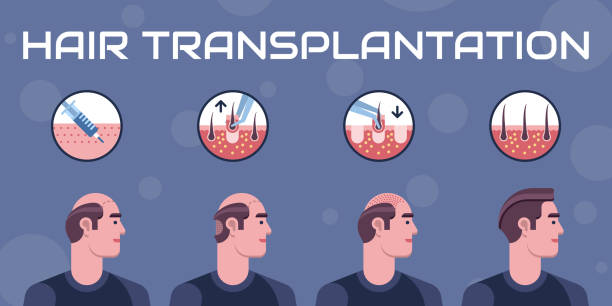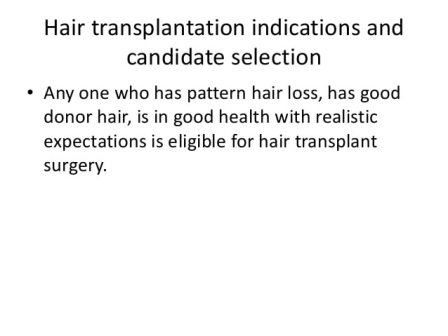Eligibility criteria for hair transplant surgery among male and females is different. Normally 24 to 25 years of age in male is considered for this procedure or when no more active hair fall and baldness would be visible. Several people experience thinning or the development of bald spots. At such an occasion, these people search for remedies or procedures that they can opt for to counter their baldness. Several people look towards surgical option as it is an uncomplicated and effective treatment. With grafting, patients have many questions regarding the procedure, some of which are answered here.
How do you qualify for a hair transplant?
Firstly, you have to evaluate where you stand mentally and emotionally with regards to your baldness. Are you mentally affected? Is it affecting your social life? Think about it.
Second, you need to be realistic about what getting this procedure entails, i.e., how restorative it is, how long it will take to grow back etc. You have to make sure you’re ready to give the attention it will need before and after the procedure. Most importantly, there must be donor sites available for the surgery to take place.

Who is not suitable for a hair transplant?
The major barrier would be the unavailability of donor sites on the scalp. Meaning if the patient is fully bald, then they will not be eligible for. If your alopecia is due to radiation therapy, then these may grow back on its own, and there is no need for a transplant. If it is because of an autoimmune disease, or similar medical condition, then, unfortunately, surgery isn’t the solution for you. Additionally, if hair loss is caused by stress, then stress management therapy would be more beneficial. Lastly, people in their late teens and early twenties are discouraged as baldness pattern is not fully evident.
It is better to consult a professional to determine your eligibility and discuss what options are available to you.
Who is a good candidate for a hair transplant?
A person whose condition has given way to a pattern of baldness is an ideal candidate. Mostly, men are affected by patterned baldness and are more likely to get the treatment than women.
More important are the characteristics of shaft.
Hair Color
It is better if your hair color matches your scalp tone, i.e., light-colored on light-colored skin. This is because the eye is prone to notice a contrast in colors.
Hair Diameter
What is the diameter of your hair? That is a significant indicator as thicker diameter provides more coverage. Meaning you will require less grafts if you have thicker shaft. The less light that penetrates, the less bald you will appear.
Hair Density
If you have a good density at donor area- specifically at the back and sides of the scalp- then you are certainly a good candidate. This entails that you have enough grafts available to be transported to problem areas and still cover the sides and back of your head.
Scalp Laxity
Scalp laxity- how elastic the skin on your scalp is; can also affect the process. A scalp with high laxity is ideal because it can be tricky to remove follicles from a scalp with low laxity.
Can you transplant hair from another person?
Unless you have an identical twin available, no, you can not transfer grafts from another individual. Doctors believe that implanting strands with different genetic makeup will bear no fruit. The immune system of the recipient will become activated and reject the donated follicles- eventually causing these to fall out. Even if you do have an identical twin, it is highly likely the procedure will not be performed as the risk of rejection is too great. If the procedure is performed, the recipient will have to take anti-rejection medication for the rest of their lifetime. It is better to seek alternatives like body hair transplant.
Can I get a hair grafts at 25?
You can, but it is not advised by most doctors. When a young patient decides to get surgery, the strip scar mark will remain forever in the donor area. But, with time, the thinning of surrounding areas will likely progress. This pattern will give the patient an unnatural look, leading to getting another surgery done. You may have to wait for a pattern to emerge.
If you have a pattern evident and has increased in severity, then it may be plausible to get the cosmetic procedure done at such an age. However, it is better to get a thorough consultation before coming to any decision.
What happens if you don’t have enough donor grafts?
If you do not fit the eligibility criteria for hair transplant because of a lack of donor sites, then there are other options available. Loss of donor hair could be for any number of reasons; perhaps you have reached an accelerated stage of balding, or maybe you have had the surgery done before and the areas were depleted.
Thankfully, it is entirely possible for the surgeon to take grafts from other areas from the body such as the beard, to perform the grafting- a process called BHT.
Again, it is better to consult a professional.
Conclusion
People experience varying degrees of baldness in their lifetime, some more than others. Some people might want to get the cosmetic procedure to restore their glory . For the surgery to be performed, it is important that the person is eligible, i.e., they have donor sites available, have a visible pattern of baldness, scalp flexibility, etc. Having certain shaft characteristics also helps. While you can get the procedure done at 25 but it’s better to wait until a specific pattern to emerge. Waiting will help distinguish which strands are resilient and which are likely to fall and a natural finish will be obtained. There may not be enough density at the donor area and the patient might seek other options. One option that is not helpful is transplanting hair from another person, the body will reject foreign hair. It would be better if, in such cases, the patient opts for body hair transplant. For an expert advice you may visit our clinic or send us photos via WhatsApp +923334309999
People also search
| 1321 grafts before after | 2826 grafts before after |
| 2782 grafts photos | 2500 grafts result |
For Free advice | +923334309999


